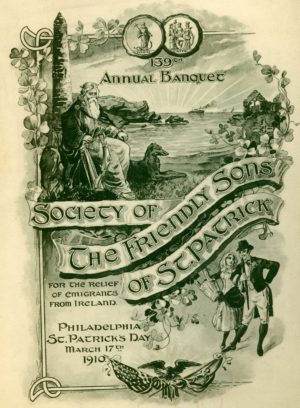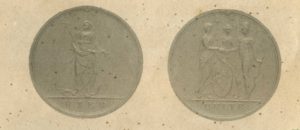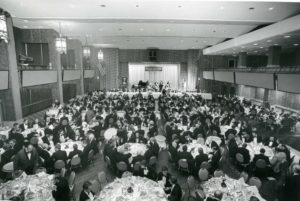 On St. Patrick’s Day in 1771, a group of Irish immigrants met to form a social group, Members included, Stephen Moylan (later secretary to George Washington), Thomas Fitzsimmons (one of only two Catholics to sign the Constitution), and George Meade (banker and trustee of Old. St. Mary’s).[1] The group was non-denomination and had members from Catholics to Quakers.[2] The group created a constitution, limiting members to those that were “the descendants of Irish parents by either side in the first degree, and the descendants of every member ad indinitum [forever].”[3] Quarterly meetings were held at a rotating number of taverns in Philadelphia, including the City Tavern. However, no meetings were held during the occupation of the city by the British during the Revolution.[4]
On St. Patrick’s Day in 1771, a group of Irish immigrants met to form a social group, Members included, Stephen Moylan (later secretary to George Washington), Thomas Fitzsimmons (one of only two Catholics to sign the Constitution), and George Meade (banker and trustee of Old. St. Mary’s).[1] The group was non-denomination and had members from Catholics to Quakers.[2] The group created a constitution, limiting members to those that were “the descendants of Irish parents by either side in the first degree, and the descendants of every member ad indinitum [forever].”[3] Quarterly meetings were held at a rotating number of taverns in Philadelphia, including the City Tavern. However, no meetings were held during the occupation of the city by the British during the Revolution.[4]
The Friendly Sons, despite being a social group, took a definite stance on the American Revolution. It expelled on of its members in 1776 for siding with the British.[5] Many members of the group were active within the Revolution, such as Commodore John Barry and General Anthony Wayne. Furthermore, the members of the society helped fund the war effort by establishing a bank to provide provisions to the American forces.[6]

Medal that members had to wear. Features St. Patrick on one side and America and Ireland with Liberty on the other.
On Dec 17, 1781, the society decided to add George Washington to the group; however, they wanted to make him more than an honorary member. So the Friendly Sons toke a vote and formally adopted Washington as an Irishman.[7] Reasoning that if they all counted themselves adopted Americans, he could be adopted into the Irish. Washington was then invited to a dinner by the Friendly Sons on January 2, 1782.[8]
By the 1790s the group began to lose membership and many members sought to change the focus from just a social group to a charitable one. This gave rise to the Hibernian Society for the Relief of Emigrants from Ireland formed in 1790.[9] When the Friendly Sons stopped meeting in 1798, the Hibernian Society saw itself as the “immediate successor and lineal descent of that glorious society.”[10] Indeed, for many years the Hibernian Society used the 1771 date for the reckoning of their annual dinners and in 1898 changed their name to the Society of the Friendly Sons of St. Patrick for the Relief of Emigrants from Ireland.[11] With that the society has continued to meet and function with the city as a social and charitable organization.
[1] List of members of the Hibernian Society for the Relief of Emigrants from Ireland, together with the list of members of the Friendly Sons of St. Patrick, 1771-1884, (Philadelphia: The Hibernian Society, 1884), P001.2003
[2] Redmond P. Conlon, Toast the Friendly Sons of St. Patrick: Forty-first Annual Banquet of the Society of the Friendly Sons of Saint Patrick of Newark, NJ, March 17, 1911
[3] Samuel Hood, A brief account of the Society of the Friendly Sons of St. Patrick : with biographical notices of some of the members, and extracts from the minutes, (Philadelphia: The Hibernian Society, 1844), P001.0487
[4] Ibid.
[5] List of Members, P001.2003.
[6] John H. Campbell, History of the Friendly Sons of St. Patrick and of the Hibernian Society for the Relief of Emigrants from Ireland, March 17, 1871-March 17, 1892 (Philadelphia: The Hibernian Society, 1892), 2006.067.01
[7] Ibid.
[8] Hood, A Brief Account, P001.0487
[9] Act of Incorporation, Bylaws, etc. of the Hibernian Society for the Relief of Emigrants from Ireland, Philadelphia, 1859, AC119.
[10] Hood, A Brief Account, P001.0487
[11] 116th Annual Banquet of the Hibernian Society Banquet Programs: 1887, AC 119; 126th Annual Banquet of the Hibernian Society Banquet Programs: 1887, AC 119; the Society of the Friendly Sons of St. Patrick for the Relief of Emigrants from Ireland: Proceedings of the 128th Anniversary Dimer, 1899, AC 196


